The traditional economy is being phased out in advanced countries that are transitioning to an internet-first economy dominated by the tech industry and digital platforms, according to Balaji Srinivasan, a former executive at crypto exchange Coinbase and the author of “The Network State.”
“The legacy economy is being sunset in favor of the Internet economy,” Srinivasan said in an X post on Saturday.
He shared a chart showing the price divergence between the “Magnificent Seven” tech stocks, which are enjoying meteoric growth, and the remainder of companies in the S&P 500 index, which have remained fairly flat since 2005.
Magnificent Seven tech stock performance versus the remaining 493 companies in the S&P 500 index. Source: Balaji SrinivasanThe S&P 500, a core economic benchmark, is a weighted stock market index of the 500 biggest companies by market capitalization listed on the US stock market. Srinivasan said:
The Magnificent Seven includes consumer tech giants Apple and Microsoft, online marketplace Amazon, the parent company of Google, social media and augmented reality company Meta Platforms, high-performance computer chip manufacturer Nvidia, and electric car maker Tesla.
Technology and internet stocks dominate the US stock market. Source: TradingViewSrinivasan popularized the concept of Network States, distributed online communities that he said will one day supplant traditional nation-states.
These network states will require internet-native money in the form of cryptocurrencies and represent a pivotal shift in the human story, much like the shift from agrarian to manufacturing economies during the Industrial Revolution.
Related: Crypto isn’t Web 3.0, it’s Capitalism 2.0 — Crypto exec
Out with the old and in with the new, blockchain and AI are disrupting the legacy system
The legacy financial system and state governments are typically slow to embrace new technologies and often stifle technological innovation.
However, regulators and lawmakers in the United States are currently pushing for the research, development, and integration of artificial intelligence and blockchain technology to modernize the financial system.
The US Securities and Exchange Commission (SEC) and the Commodity Futures Trading Commission (CFTC) released a joint statement in September teasing the shift to 24/7 capital markets to bring the legacy financial system up to speed with crypto, which trades around the clock.
The US government also tapped oracle providers Pyth Network and Chainlink to publish government economic data onchain for added budget transparency and accountability to the public.
Magazine: The one thing these 6 global crypto hubs all have in common…
Source: https://cointelegraph.com/news/traditional-economies-sunset-favor-internet?utm_source=rss_feed&utm_medium=feed&utm_campaign=rss_partner_inbound


